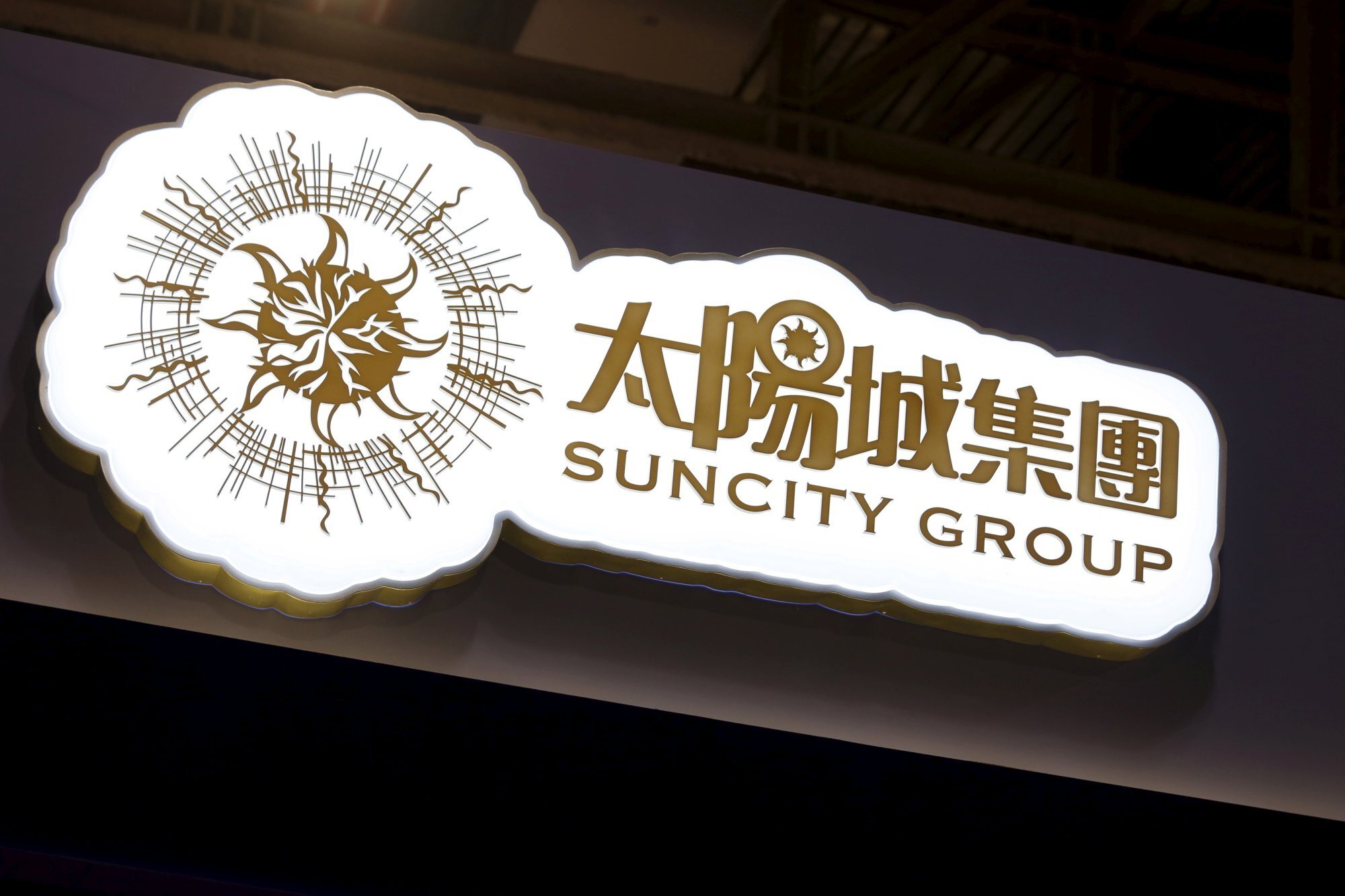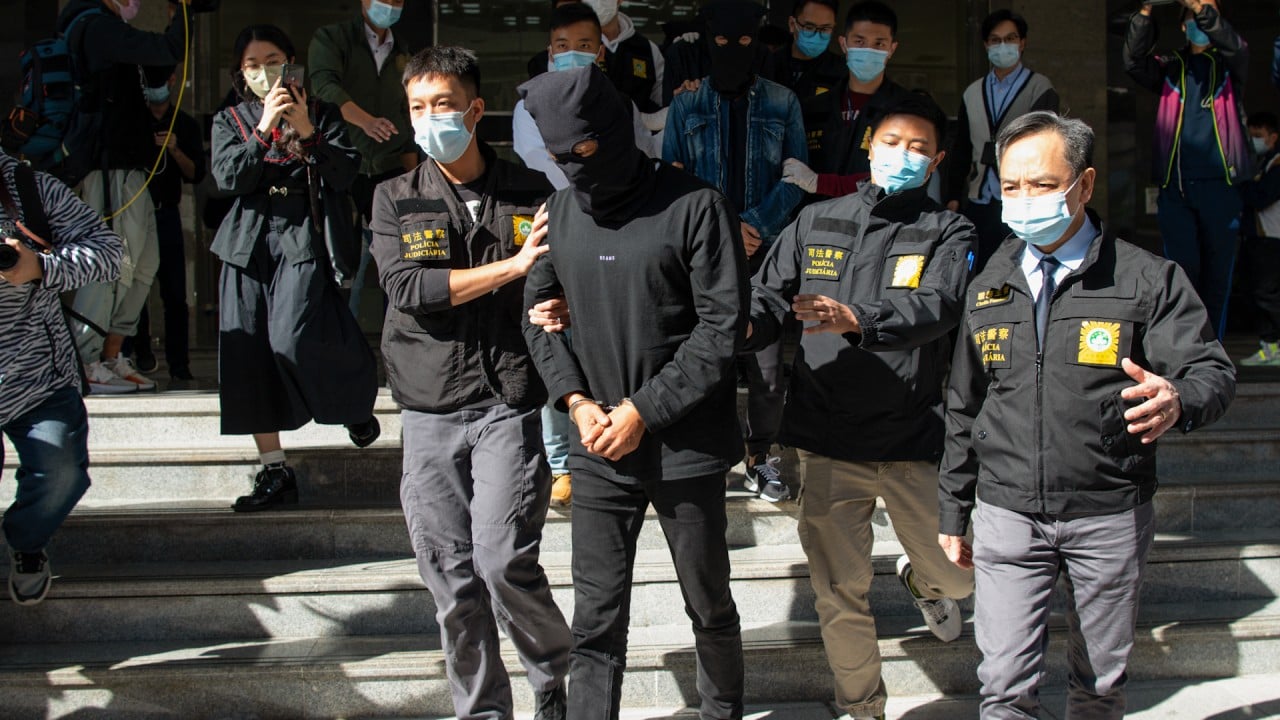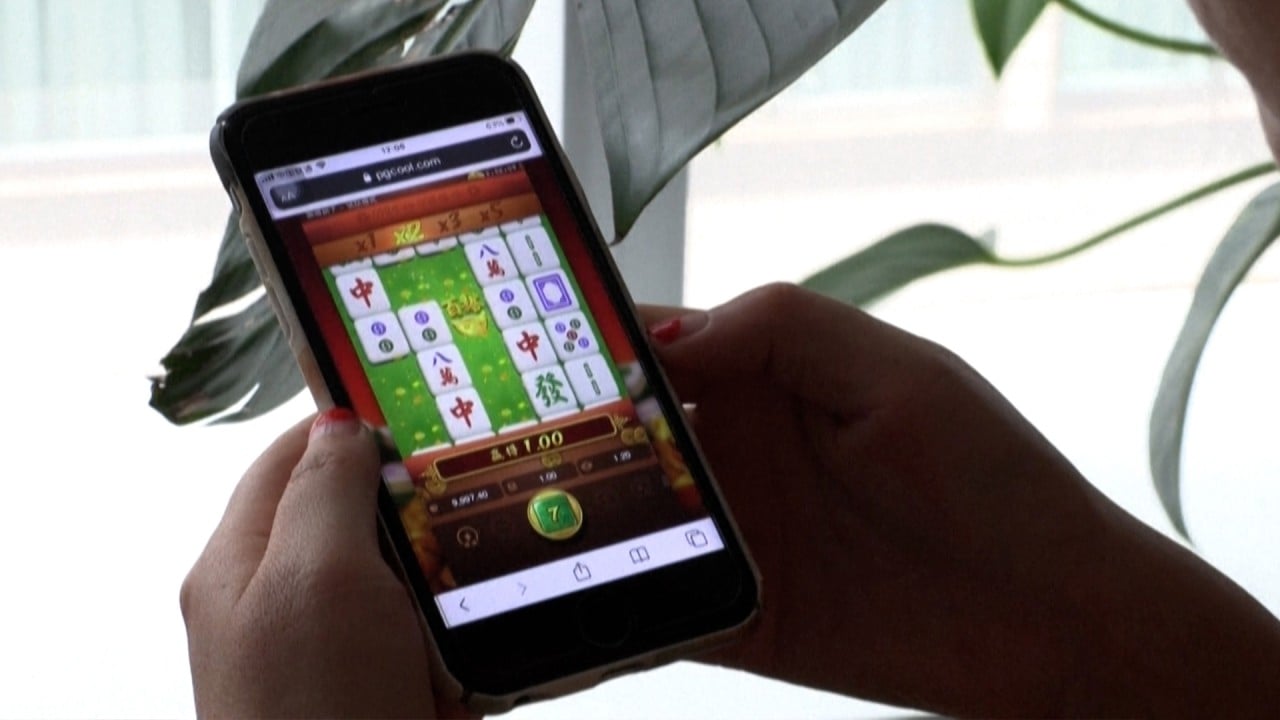
Junket king Alvin Chau’s arrest signals end of winning streak for Macau casinos as Beijing cracks down on gambling
- Observers say Chau’s arrest has sent shock waves through the gaming industry as the junket business has been vital to the sector and long tolerated by China
- Sector is expected to continue to shrink, but some expect a reinvention of casino hub’s economy centred possibly on entertainment and integrated resorts
The message was plain – behave and do not cross the line by engaging in grey-area or criminally risky activities, such as luring mainland Chinese punters into betting illegally online, as these would no longer be tolerated by Beijing, which has issued a number of anti-gambling edicts in recent years.
Mainland authorities’ issuance of an arrest warrant for Chau has also landed the Macau government in a dilemma over whether to transfer the city’s permanent resident across the border in the absence of an extradition agreement with the mainland.

Macau’s judiciary police said last Sunday they had detained nine men and two women as part of an investigation launched in August 2019 into the setting up of gambling platforms outside Macau and the luring of mainland punters into betting illegally online.
Without naming him in full, police said a 47-year-old Macau businessman surnamed Chau was among the arrested. They called Chau the head of the syndicate.
Macau junket magnate denied bail over illegal gambling, money-laundering
Nicknamed “Wash Rice Wa”, a moniker borrowed from a 1980s Cantonese sitcom character with his surname and good looks, Chau is now in pre-trial detention to prevent him from fleeing the casino hub. Netizens meanwhile were gleeful in realising the irony that “wash rice” is also Cantonese slang for money laundering.
As Suncity’s shares plunged 50 per cent last week, pulling down all of the city’s casino stocks, Macau’s Gaming Supervision and Coordination Bureau said on Wednesday it had been notified by gaming enterprises that they had stopped working with the conglomerate and had temporarily closed its VIP gaming rooms.
The CEO of gaming and hospitality investor Suncity Group, Chau was first questioned by Macau police on Saturday after the public security department in Wenzhou, Zhejiang province, a day earlier issued an arrest warrant over his suspected involvement in running illegal cross-border gambling activities.
Suncity Group is the largest junket operator in Macau, with a market share of 40 per cent, according to an industry insider. Junket operators are go-betweens who bring high rollers on all-expenses-paid trips to play at casinos, extending them credit and collecting on their debts.
Ben Lee, managing partner of the gambling consultancy IGamiX in Macau, noted the central role played by Suncity in the casino hub. “The revenue Suncity generated was larger than some of the casino operators. No property would be viewed as a serious destination if it did not receive the imprimatur of having a Suncity VIP room in it,” Lee said.

Chau grew Suncity from operating high-roller tables in Macau casinos into a sprawling conglomerate in less than two decades with thousands of employees and interests ranging from property development to travel agencies and resorts.
He recently made it into seventh place on a list of the 50 most powerful people in Asian gaming compiled by media group Inside Asian Gaming.
Eilo Yu Wing-Yat, a political scientist at the University of Macau, believed that Macau police’s high-profile actions were in response to Wenzhou authorities’ issuance of the arrest warrant for Chau.
“Chau’s arrest and Wenzhou authorities’ actions presented strong signals that Beijing no longer tolerates the activities of Macau’s casino junket operators targeting mainlanders, including the luring of mainland punters into betting illegally online,” Yu said. “Obviously Chau is not the only target.”
Lee said despite Beijing’s ongoing crackdown on gambling, Chau’s arrest shocked the gaming industry as the junket business, pioneered by the late Macau casino mogul Stanley Ho Hung-sun, was not only vital to the industry but had long been tolerated by the mainland.
“Currently, junket operators are licensed for such activities in Macau,” he said. “The conduct of the activities outside Macau falls into a grey area and until now, China has tolerated these.”
Lee expected the junket business – estimated to make up about half of gaming revenues before the pandemic – would shrink in the wake of the arrest, accelerating the decline which began in the past two years as Macau’s gambling industry was haunted by the mainland’s crackdown on gambling.
Macau police question Alvin Chau over cross-border gambling allegations
In 2020, for example, the central government introduced legislation banning marketing to attract mainland gamblers, who formed the bulk of high rollers or ‘whales’ as they are known in the business.
“Beijing had issued a number of anti-gambling edicts in the past few years. They also started taking action against underground money channels,” Lee said.
He added that Beijing’s tough stance was long in the making, as it had “sent numerous warnings since 2012 with the advent of the anti-corruption as well as anti-ostentation campaigns, [along with] strong suggestions that our gaming industry should not grow faster than China’s own GDP [gross domestic product]”.
But these warnings, he said, had been repeatedly ignored. Lee noted that junket business once accounted for more than 60 per cent of Macau’s gross gambling revenue, but this plunged to just 30 per cent recently.
He said the arrest was a signal to Macau that “it is no longer business as usual”.
“From now on, you cannot, and should not, focus on mainland China as a key gaming market. And you really need to diversify your industry. Macau should also diversify its economy and reduce its reliance on gambling,” he said.
Macau’s gambling industry contributes 80 per cent to the city’s tax coffers every year.
In July last year, when rumours surfaced he was the target of investigations, Chau released a video denying all illicit activity as he declared that his company had “never sent anyone to promote gambling on the mainland, and never participated in any underground money-laundering business”.
A mainland official said, according to investigations, Chau’s statement was “not true” at all. “There is clear evidence showing Chau has an extensive gambling network in mainland China. As for the other allegations, there’s no smoke without fire,” the source said.
A Macau official source familiar with the situation said Chau had lost support from the mighty Ho family after the death of its Hong Kong-born patriarch at age 98 last year.
The Macau government liberalised the gaming market in 2002, breaking the monopoly of SJM Holdings, owned by Stanley Ho who was dubbed the “King of Gambling”.
Authorities in the casino hub went on to give three American operators, Sands China, Wynn Macau and MGM China (a joint venture with Stanley Ho’s daughter, Pansy Ho Chiu-king) the casino concessions, changing the industry dramatically.
Gambling revenue in Macau now surpasses that of Las Vegas, making the city the world’s biggest casino hub.
Macau’s gaming operators cut ties with junket king Alvin Chau after his arrest
All the concessions, along with those of three Macau and Hong Kong operators, will expire in June next year, and the local government has already said it is “actively working” on terms for a new licensing system for the casinos.
The six licences that require renewals are Sands China, Wynn Macau, Galaxy Entertainment, SJM Holdings, Melco Entertainment and MGM China.
The American casino operators have helped modernise Macau’s gambling industry, but with no signs of tensions between the United States and China abating, whether and how the friction between the world’s two biggest economies would affect American casino licences in Macau has emerged as a US$1 billion question.
Macau academic Eilo Yu pointed to a recent ruling by the city’s top court, under which casino operators could be liable for any debts left by defunct junkets, as another worrying sign for American casino operators.
The court ordered Dore Entertainment Limited on November 19 to return HK$6 million plus interest to one of its VIP room clients. According to a statement issued five days later, the top court ruled that Wynn Resorts (Macau) needed to share responsibility for the case by helping Dore return the money to the client.
Yu said there had been some grey areas in the city’s gambling industry where intermediaries did some business for casino operators. “From now on, casino operators can no longer hide behind junket operators for dubious gambling activities,” he said.
In September, the Macau government solicited public opinion about overhauling the city’s gambling laws with the proposed revisions, signalling heightened scrutiny of capital flows and daily operations.
The consultation which has ended sought views on a raft of rules, including additional government oversight, permission requirements for the remittances of dividends and a proposal to slash the number of gambling tables.
The proposal also suggests casinos increase the shareholdings held by Macau permanent residents. In sum, the net effect of the changes would make it much more difficult for foreign operators to send profits back to their home countries.
The amendments are expected to come into effect before Macau’s six casino concessions expire in June 2022, even as city leader Ho Iat-seng had floated the idea of a temporary extension of the licences if the laws were not passed in time.
The gambling crackdown came even as the industry in Macau was reeling from the impact of the Covid-19 pandemic, and while revenue had picked up this year, it was still less than a third of previous years’ highs.
Gambling, which is banned on the mainland because it is anathema to Communist Party doctrine, has been legal in Macau since 1850 when the city was under Portuguese colonial administration. When it reverted to Chinese sovereignty in 1999, the gambling operations and the concessions were maintained.
Chinese President Xi Jinping made Macau’s casinos a target of his anti-corruption campaign in 2012, banning party cadres and government officials from gambling.
The arrest warrant for Alvin Chau that Wenzhou police issued two days ahead of his arrest in Macau has sparked suspicion from certain quarters in the special administrative region on whether its police were taking orders from mainland authorities.
Macau judiciary police spokesman Chong Kam-leong maintained the arrests were unrelated to the mainland warrant.
Prosecutors in Wenzhou have accused Chau of being in charge of a gambling syndicate that “causes severe damage to the social order of the country”. Chau, and a person named Zhang Ningning, is also suspected on the mainland of setting up casinos there.
The syndicate is alleged to comprise 199 shareholder-level representatives and over 12,000 agents tasked with promoting gambling, and it is said to have developed a network of more than 80,000 mainland bettors, according to the Wenzhou authorities.
Announcing the issuance of the arrest warrant for Chau on its Weibo account, Wenzhou’s public security department said it had been investigating the allegations since July last year and urged him to “surrender as soon as possible” to secure a lenient punishment.
Macau casino stocks sink amid fears of China crackdown on illegal gambling
Chong said Macau police had launched their probe after receiving intelligence indicating that Chau was using his VIP junket business to establish gaming operations elsewhere and was trying to entice mainlanders into online gambling. Funds from those operations were then transferred through underground channels, Chong said.
Suncity had been in the cross hairs of the authorities for some time. In 2019, Suncity was singled out for criticism by mainland state media, which said online gambling could harm China’s social-economic order. Chau shrugged off the accusations at the time.
Jason Buhi, a constitutional law scholar who has written extensively on Macau, said it was not yet clear why the mainland authorities chose to act at this particular juncture.
“One could speculate that prosecutorial discretion may be partially influenced by a policy decision to enhance supervision of Macau’s lucrative gambling junkets during a period when gambling revenues and cross-border intercourse are already low due to the pandemic, or by Chau’s crossing the wrong person(s) at the wrong time,” he said.
Buhi said there had been ad hoc transfers of fugitives from Macau to the mainland despite a ruling by the city’s Court of Final Appeal in 2007 that local authorities could not transfer criminal suspects across the border in the absence of a formal extradition agreement.
In 2008, Macau authorities handed over to the mainland a Hong Kong permanent resident, who was detained upon arrival at the Macau ferry terminal for crimes allegedly committed on the mainland and for which Interpol “red notices” had been issued.
The Macau casino tycoon who set his sights far beyond the gambling table
Buhi, who teaches at Barry University’s school of law in Florida, said in 2015, the Macau authorities handed Wu Quansen – former party secretary of Dadun village in Guangzhou – over to Guangdong police.
Wu had been granted non-permanent residence status in Macau but was returned to face corruption charges after his permit expired in 2017.
Buhi said it was possible that the Macau government would transfer Alvin Chau to the mainland in the absence of an extradition agreement. “But there is a wild card,” the academic said, adding that none of the people handed over to the mainland previously were Macau permanent residents.
Although this case may be the impetus for a new extradition law, it is more likely that an ad hoc arrangement will be reached. Such a move would avoid retroactive application and has been the local practice for centuries.
Macau police arrest casino junket king, 10 others over alleged gambling offences
Buhi, author of The Constitutional History of Macau, said another possible scenario was that Chau faced trial and punishment in Macau.
“That would be a symbolic boost to the SAR’s autonomy and perceived rule of law. However, it is also possible that the mainland authorities will insist upon a handover for either the symbolic status of venue, or to circumvent the limited punishments available under Macau’s inherited legal system,” the law scholar said.
A Macau-based lawyer, who declined to be named, said the arrest took place at an important moment when the local government was expected to introduce “new rules for junkets and the new casino concessions are also coming up”.
“I think they want to clean up the casino industry – or, at least, to do as much as possible. They want to put things in order,” he said, noting this was consistent with the mainland authorities’ focus on “combating corruption and illicit money transfers”.
He said he expected Chau’s case to be dealt with by the authorities in Macau, given the lack of the extradition agreement with the mainland.
I think that is what the authorities want … The evolution is diversification, which is also being facilitated by Hengqin
While analysts pointed to Chau’s arrest as the beginning of the end of the once-thriving junket business, an academic suggested the reinvention of Macau’s economy was what Beijing was after.
Glenn McCartney, associate dean of the University of Macau’s faculty of business administration, said the concept of integrated resorts and entertainment was the future of the Cotai strip – a stretch of reclaimed land where most gambling developments are located.
“I think that is what the authorities want … The evolution is diversification, which is also being facilitated by Hengqin,” McCartney said, referring to a neighbouring Chinese island that has been transformed into a new tourism haven.
“I do see Macau stepping up,” the professor said. “The diversification won’t happen as quickly because of Covid-19. In order to reactivate and bring back concerts and theatres will take some time. But I am optimistic.”





